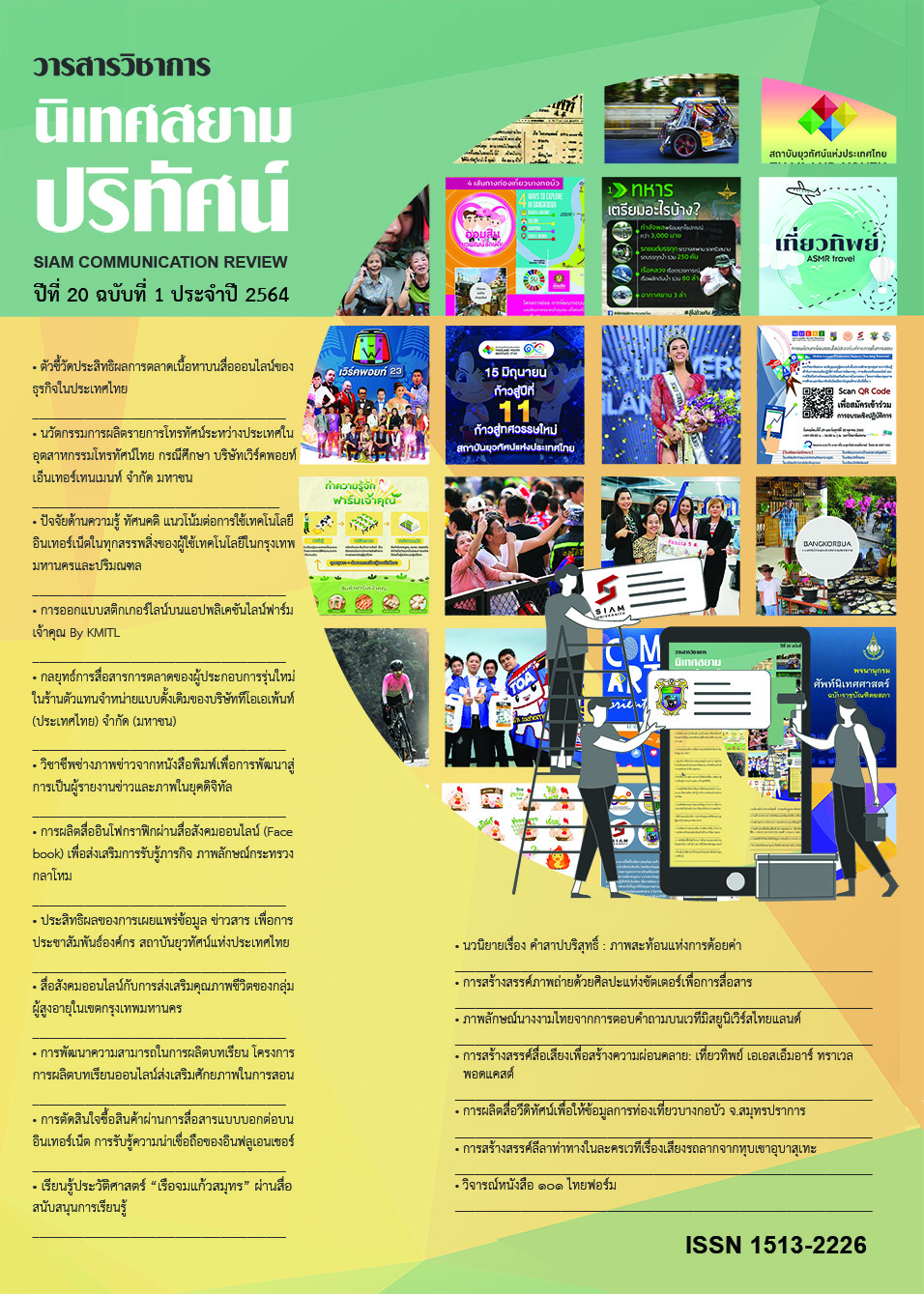ตัวชี้วัดประสิทธิผลการตลาดเนื้อหาบนสื่อออนไลน์ของธุรกิจในประเทศไทย
Main Article Content
บทคัดย่อ
การวิจัยในครั้งนี้มีวัตถุประสงค์เพื่อศึกษาองค์ประกอบ และพัฒนาตัวชี้วัดประสิทธิผลการตลาดเนื้อหาบนสื่อออนไลน์ของธุรกิจในประเทศไทย ดำเนินการวิจัยด้วยวิธีการวิจัยแบบผสมผสาน เริ่มจากการสัมภาษณ์เชิงลึก จากนั้นดำเนินการวิจัยเชิงสำรวจ มีกลุ่มตัวอย่างคือ นักวิชาชีพด้านการสื่อสารการตลาด นักการตลาดดิจิทัล นักโฆษณา นักประชาสัมพันธ์การตลาด ที่ทำงานให้กับบริษัทหรือองค์กรที่ดำเนินธุรกิจอยู่ในประเทศไทย จำนวน 360 คน โดยใช้วิธีการเลือกกลุ่มตัวอย่างแบบเจาะจง และใช้แบบสอบถามเป็นเครื่องมือในการเก็บรวบรวมข้อมูลวิจัย ผลการวิจัย พบว่า ตัวชี้วัดประสิทธิผลการตลาดเนื้อหาบนสื่อออนไลน์ของธุรกิจในประเทศไทย มี 37 ตัวชี้วัด จาก 9 องค์ประกอบ ได้แก่ 1) การสร้างโอกาสในการขาย จำนวน 4 ตัวชี้วัด 2) การสร้างการรับรู้ และค่าใช้จ่ายด้านสื่อต่อการสร้างการรับรู้ จำนวน 5 ตัวชี้วัด 3) การสร้างความผูกพันผ่านสื่อโซเชียล จำนวน 4 ตัวชี้วัด 4) พฤติกรรมการซื้อ และยอดขาย จำนวน 5 ตัวชี้วัด 5) การพิจารณาตัดสินใจซื้อ จำนวน 4 ตัวชี้วัด 6) การคิดค่าใช้จ่ายต่อการเกิดพฤติกรรมที่ต้องการ จำนวน 5 ตัวชี้วัด 7) ความผูกพันบนเว็บไซต์ จำนวน 3 ตัวชี้วัด 8) การเปิดรับเนื้อหา จำนวน 4 ตัวชี้วัด 9) การสนับสนุนแบรนด์ จำนวน 3 ตัวชี้วัด ผลการศึกษาที่ได้สามารถนำมาใช้เป็นแนวทางในการกำหนดตัวชี้วัดประสิทธิผลการตลาดเนื้อหาบนสื่อออนไลน์ให้กับธุรกิจในประเทศไทยได้อย่างเหมาะสมต่อไป
Article Details
เอกสารอ้างอิง
ธนกฤต วงศ์มหาเศรษฐ์. (2561). การเปิดรับการตลาดเชิงเนื้อหาของผู้บริโภคสินค้าออนไลน์ในเขตกรุงเทพมหานคร. วารสารวิชาการบริหารธุรกิจ, 7(ฉบับพิเศษ), 85-94.
บรรพต วรธรรมบัณฑิต. (2560). กลยุทธ์การใช้การตลาดด้านเนื้อหา (Content Marketing) ผ่านสื่อสังคมออนไลน์เฟซบุ๊กของสื่อโทรทัศน์ไทยในปี 2560. การค้นคว้าอิสระปริญญามหาบัณฑิต สาขาวิชาการสื่อสารการตลาดดิจิทัล, มหาวิทยาลัยกรุงเทพ.
รัฐสุดา สกลกิจติณภากุล และพีรภาว์ ทวีสุข. (2560). การวิเคราะห์ปัจจัยของการตลาดด้วยเนื้อหาที่มีผลต่อความไว้วางใจของกลุ่มผู้ซื้อเสื้อผ้าในธุรกิจพาณิชย์อิเล็กทรอนิกส์. วารสารปัญญาภิวัฒน์, 9(1), 1-12.
ศุภเชษฐ์ เศรษฐโชติ. (2560). การนำเสนอการตลาดเชิงเนื้อหาบนสื่อดิจิทัลและความตั้งใจรับประทานอาหารคลีน. วิทยานิพนธ์ปริญญามหาบัณฑิต สาขาวิชาการสื่อสารการตลาดดิจิทัล, มหาวิทยาลัยกรุงเทพ.
ภาษาอังกฤษ
Barger, V., Peltier, J. W., & Shultz, D. E. (2016). Social media and consumer engagement: A review and research agenda. Journal of Research in Interactive Marketing, 10(4), 268-287.
Elisa, R., & Gordini, N. (2014). Content marketing metrics: Theoretical aspects and empirical evidence. European Scientific Journal, 10(34), 92-104.
Gunelius, S. (2011). Content marketing for dummies. New York: Wiley.
Handley, A., & Chapman, C. C. (2010). Content rules: How to create killer blogs, podcasts, videos, ebooks, webinars (and more) that engage customers and ignite your business. New Jersey: John Wiley & Sons.
Jefferson, S., & Tanton, S. (2013). Valuable content marketing. How to make quality content the key of your business success. London: Kogan Page
Kotler, P., Kartajaya, H., & Setiawan, I. (2016). Marketing 4.0: Moving from traditional to digital. New Jersey: John Wiley & Sons.
Lieb, R. (2011). Content marketing: Think like a publisher. How to use content to market online and in social media. Indianapolis: Que Publishing.
Odden, L. (2012). Optimize. USA: John Wiley & Sons.
Pulizzi, J., & Barrett, N. (2009). Get content. Get customers. New York: McGraw-Hill.
Pulizzi, J. (2014). Epic content marketing. USA: McGraw-Hill Education.
Ramos, R. (2014). Content marketing: insider’s secret to online sales and lead generation. New York: One Night Expert Publishing.
Slater, D. (2014). Content marketing: Recycling and reuse. New York: i30 Media Corporation.
ระบบออนไลน์
ณัฐพัชญ์ วงษ์เหรียญทอง. (2559). แนวโน้มการทำ Digital content marketing ในปี 2017. เข้าถึงได้จาก http://www.nuttaputch.com/
สมาคมโฆษณาดิจิทัล (ประเทศไทย). (2564). Press report Thailand digital advertising spend 2020 - 2021. เข้าถึงได้จาก https://www.daat.in.th/digital-ad-spend
Asimos, T. (2015). Key performance indicators for measuring content marketing success. Retrieved from https://www.circlesstudio.com/blog/key-performance-indicators-for-measuring-content-marketing-success/
Beets, L. M. (2017). New research reveals habits of top content marketers. Retrieved from https://contentmarketinginstitute.com/2017/09/research-habits-content-marketers/
Content Marketing Institute. (2016). B2C 2017 Content marketing benchmarks, budgets, and trends-North America. Retrieved from https://contentmarketinginstitute.com/wp-content/uploads/2016/10/2017_B2C_Research_Final-rev-10-26-16.pdf
Content Marketing Institute. (2019). B2C Content marketing 2020. Benchmarks, budgets, and trends. Retrieved from https://contentmarketinginstitute.com/wp-content/uploads/2019/12/2020_B2C_Research_Final.pdf
Goliger, S. (2015). 5 ways to translate your content marketing goals into key performance indicators (KPIs). Retrieved from http://contentmarketinginstitute.com/2015/06/content-marketing-goals-kpis/
Kallas, P. (2018). 48 social media KPIs you need to know (Key Performance Indicators). Retrieved from https://www.dreamgrow.com/48-social-media-kpis-key-performance-indicators/
Thumbsup. (2560). Digital Matters 9: “คิดแบบ Content Publisher เขาคิดกันอย่างไร?”. เข้าถึงได้จาก http://thumbsup.in.th/2017/09/digital-matters-9-how-content-publisher-think/


